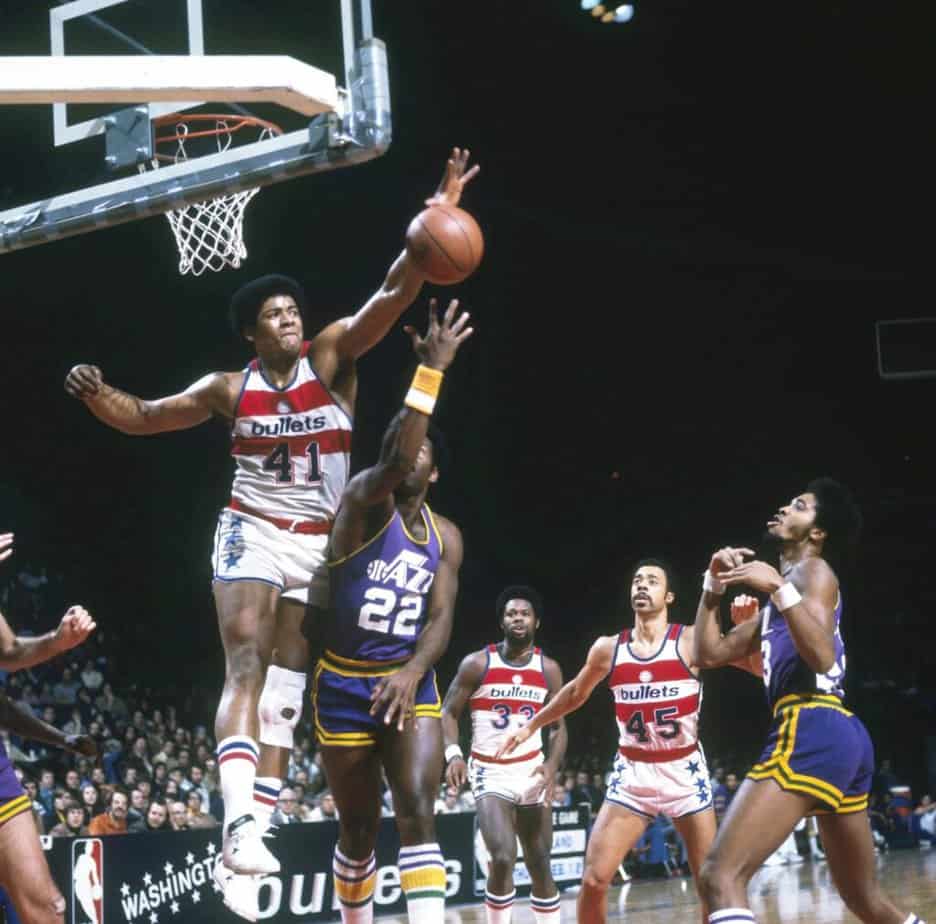The best defensive team in NBA history, based on the defensive rating metric, are the 1974-75 Washington Bullets. The defensive rating metric shows how efficient a team’s defense is, based on how many points a team allows per 100 possessions. The 1974-75 Bullets had a 91.3 defensive rating, the best defensive rating in NBA history since the defensive rating was recorded.

What is defensive rating?
Defensive rating is essentially a metric to understand how efficient a team’s defense is. The number of points allowed is not always the best indicator of how efficient a team’s defense is, so defensive rating takes into account the number of possessions. Not every team plays the same number of possessions due to different paces, so defensive rating looks at how defenses perform per 100 possessions. The calculation for defensive rating is below:
(Total points allowed / total defensive possessions) * 100 = defensive rating
or
(Average points allowed per game / average defensive possessions per game) * 100 = defensive rating
Therefore, when comparing team defenses, a team with a lower defensive rating allows less points per 100 possessions compared to a team with a higher defensive rating. For example, the 1974-75 Washington Bullets had a 91.3 defensive rating, meaning that per 100 possessions, they only allowed 91.3 points.

What was the 1974-75 Washington Bullets defense like?
Defensive rating has only been measured since 1973-1974, but the 1974-1975 Washington Bullets have held the record for the best defensive rating ever for a little under 50 years. The Bullets were bound to be a great defensive team with Elvin Hayes and Wes Unseld, two Hall of Fame centers. Hayes was the defensive star of the team, with 2.3 blocks and 1.9 steals per game, while Unseld also had 1.6 steals per game. Guards Phil Schenier and Kevin Porter were also a great defensive backcourt, with 2.3 steals and 1.9 steals per game respectively.
An underrated part of defensive efficiency is preventing offensive rebounds and second-chance points. Unseld and Hayes were great defensive rebounders, with Unseld grabbing 10.4 defensive rebounds per game and Hayes grabbing 9.5 defensive rebounds per game. Both players’ excellence on the glass is reflected in their positions as top-10 rebounders of all time.
As a team, the 1974-75 Bullets ranked highly on many defensive stats: 5.0 blocks per game (3rd in the league), 11.3 steals per game (2nd in the league), and 22.5 forced turnovers per game (2nd in the league). They were also a very good offensive team, with 104.7 points per game (7th in the league) and a 98.0 offensive rating (how many points a team scores per 100 possessions, similar to defensive rating; the Bullets ranked 8th that season in offensive rating).
The combination of an excellent defense and a very good offense led the Bullets to a great regular season record, 60-22. The Bullets made their way to the NBA Finals where they met their match in the Golden State Warriors, losing all 4 games.
Are the 1974-1975 Washington Bullets the best defensive team ever?
Using the defensive rating metric, it’s clear that the 1974-75 Washington Bullets were the most defensively efficient team ever. Well, technically, that “ever” comes with an asterisk: the NBA only began to record defensive rating beginning with the 1973-74 NBA season. Prior to this era, the NBA was an increasingly defensive league; unofficial statistics for many teams from that era include defensive ratings in the 80s, going as low as 79.3 for the 1951-52 Minneapolis Lakers.
One way to use the defensive rating metric to see how good a defense is is to compare the defensive rating of a team to the league average defensive rating. If the difference is significantly lower, the greater the defense is, as compared to the rest of the league. For example, if the league average defensive rating is 110 (indication that the league is filled with high-scoring offenses), and a team’s defensive rating is 95, that means that they were allowing 15 points less than the average defense that season, indicating how strong that defense is. The lesser the difference, the less that team’s defense stands out against the rest.
Using that metric, the greatest defense ever in terms of margin of defensive rating are the 2003-04 San Antonio Spurs. They had a 94.1 defensive rating that year, compared to the league average of 102.9; meaning that they allowed 8.8 points per 100 possessions than the average team defense that year. Their 94.1 defensive rating is also the 5th-best ever, which stands out immediately; most defenses towards the top of the list are from the mid-1970s (known as the pre-ABA merger era).
The 2003-04 Spurs were excellent defensive rebounders and shot blockers, but their numbers for steals and forced turnovers were above average. But their defensive impact was clear with their 84.3 points allowed per game, which was the best record in the league. This is an indicator that good defense may not always translate well to the stat sheet, as the Spurs were an all-time great defense. Unfortunately, the Spurs were middle-of-the-pack on offense, but still managed a 57-25 record and got to the Western Conference, where they ultimately exited.
Defense in the NBA is the key ingredient to a championship, arguably even more so than offense. Having a great defense like the 1974-75 Washington Bullets and the 2003-04 Spurs allows for teams to make deep runs into the playoffs. The best example of this may be the 2003-04 Detroit Pistons, another all-time great defense with a very average offense. Their elite defense won them the championship that year, and will forever be used as an example that defenses win championships in the NBA.
Note: all stats pulled from StatMuse and Basketball-Reference
